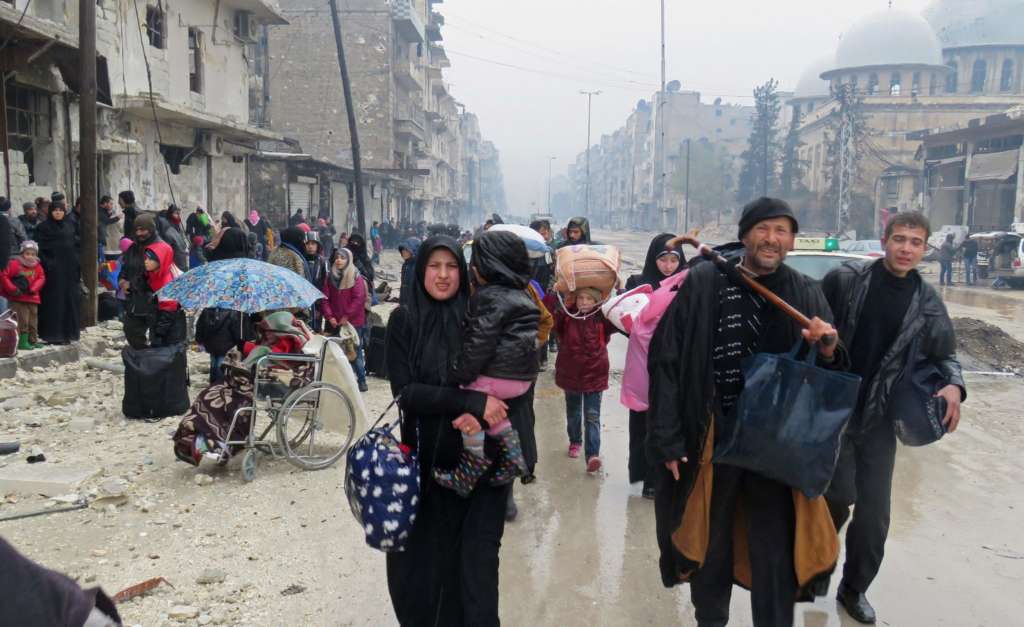Hasakeh, Syria – The ISIS order that prompted Mahmud al-Ali to flee his town was simple: “All young men aged 20 to 30 years old must enlist to fight throughout Syria.”
As the terrorist group loses territory across the country, it has begun to impose forced enlistment on men in Deir Ezzor, the last Syrian province that remains nearly completely under ISIS control.
The measure has prompted many residents of villages and towns in the eastern province, like 26-year-old Ali, to flee en masse.
Many of them have sought refuge in makeshift camps for the displaced in the neighboring province of Hasakeh, including one seven kilometers from the town of Arisha.
In the middle of the desert, the camp is a sea of tents with the logo of the UN refugee agency UNHCR.
Here and there, women and children sit on the ground under the blistering heat, but the camp is dominated by young men fleeing conscription.
“ISIS told us that fighting was now a duty,” said Ali, who left his town of Al-Eshara, southeast of Deir Ezzor city, along with his family.
“But the majority of the young men refused and thousands of us fled,” added Ali, wearing a traditional robe and the long beard mandated by IS.
Residents and the Syrian Observatory for Human Rights monitoring group report that the militants announced via Friday sermons, loudspeakers and leaflets that residents had a week to register their names at recruitment offices.
“The situation became critical,” said 28-year-old Salah.
“They carried out raids in houses searching for young men to conscript into their forces,” added Salah, who fled Mayadeen, Deir Ezzor’s second largest city.
He said the raids netted many.
According to Ahmed al-Abed, also from Mayadeen, those forced by the militants to enlist “have to undergo a month of training and then they fight for them for four months.”
Many have not been able to escape, and remain trapped in the oil-rich province which has been largely under the control of ISIS since 2014.
“There are people still trapped who can’t get out. We paid (smugglers) two million Syrian pounds (nearly $4,000) for 15 members of our family,” Abed told Agence France Presse.
But even with the guidance of a smuggler, escaping the clutches of ISIS remains a dangerous affair, especially after the group boosted security to stem the flow of fleeing residents.
ISIS has suffered a slew of defeats in recent months.
After being pushed out of Aleppo province in northern Syria, it has lost half its de facto Syrian capital Raqqa city to US-backed fighters.
It is on the verge of being completely expelled from Homs province by Russian-backed Syrian regime forces, who are now advancing towards Deir Ezzor from several directions.
Under pressure, it appears to be mobilizing all available resources to defend the eastern province.
The recapture of Deir Ezzor “would largely — if not completely — mark the end of the fight against ISID,” Russia’s Defense Minister Sergei Shoigu said on Sunday.
The militants told young men “we want you to support us in the battle for Deir Ezzor,” said Hazem al-Satem, also from Al-Eshara.
“But nobody wanted to join them,” the 25-year-old said.
For those who have escaped, the relief at their freedom is tempered by the miserable conditions they now face in camps for the displaced, including shortages of food, water and medicine.
Arisha camp was established two months ago on the edge of a makeshift oil refinery.
It hosts more than 7,000 people, but has just 400 tents.
On Monday, the International Committee of the Red Cross warned that displaced civilians faced “terrible, terrible conditions”.
“These tents are literally in the middle of the desert. You have snakes and scorpions that are a daily threat for people,” ICRC spokeswoman Ingy Sedky told AFP after visiting the area.
“You see children playing in toxic waste, drinking and bathing in contaminated water.”
Despite the conditions, 28-year-old Ibrahim Khaled is grateful to have escaped.
“We were able to save our lives,” he told AFP.
“I’m sure that for those who stay it is almost impossible to escape.”
